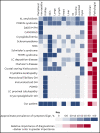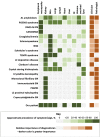Monoclonal gammopathies of clinical significance
- PMID: 33275738
- PMCID: PMC7727544
- DOI: 10.1182/hematology.2020000122
Monoclonal gammopathies of clinical significance
Abstract
"Monoclonal gammopathy of clinical significance" (MGCS) is the term used to describe nonmalignant monoclonal gammopathies causing important disease. MGCS is the differential diagnosis for any patient presenting with what appears to be a monoclonal gammopathy of undetermined significance but is also experiencing other unexplained symptoms. Broadly, these conditions can be separated into symptoms and signs referable to the nerves, the kidneys, and the skin. The first step in making these diagnoses is to consider them. With a particular condition in mind, the next step is to order those tests that can help confirm or dismiss a particular diagnosis. Nearly all of the renal and dermatologic conditions are diagnosed by renal and skin biopsies, respectively. The importance of a highly competent renal pathologist and dermatopathologist cannot be underestimated. Biopsy is less specific for the neuropathic conditions. Because several of the MGCSs are syndromes, recognizing other manifestations is also key. Treatment recommendations for many of these conditions are anecdotal because of their rarity, but for several of the conditions, IV immunoglobulin, rituximab, and plasma cell-directed therapy are the best options.
© 2020 by The American Society of Hematology.
Conflict of interest statement
Conflict-of-interest disclosure: A.D. has received research funding from Celgene, Millennium, Pfizer, and Alnylam; has received a travel grant from Pfizer; and has served on an advisory board for Janssen. Off-label drug use None disclosed.
Figures



References
-
- Leung N, Bridoux F, Hutchison CA, et al. ; International Kidney and Monoclonal Gammopathy Research Group. Monoclonal gammopathy of renal significance: when MGUS is no longer undetermined or insignificant. Blood. 2012;120(22):4292-4295. - PubMed
-
- Fermand JP, Bridoux F, Dispenzieri A, et al. . Monoclonal gammopathy of clinical significance: a novel concept with therapeutic implications. Blood. 2018;132(14):1478-1485. - PubMed
-
- Dispenzieri A. POEMS syndrome: 2019 update on diagnosis, risk-stratification, and management. Am J Hematol. 2019;94(7):812-827. - PubMed
-
- Wang C, Huang XF, Cai QQ, et al. . Prognostic study for overall survival in patients with newly diagnosed POEMS syndrome. Leukemia. 2017;31(1):100-106. - PubMed
-
- D’Souza A, Lacy M, Gertz M, et al. . Long-term outcomes after autologous stem cell transplantation for patients with POEMS syndrome (osteosclerotic myeloma): a single-center experience. Blood. 2012;120(1):56-62. - PubMed
Publication types
MeSH terms
Substances
Grants and funding
LinkOut - more resources
Full Text Sources

